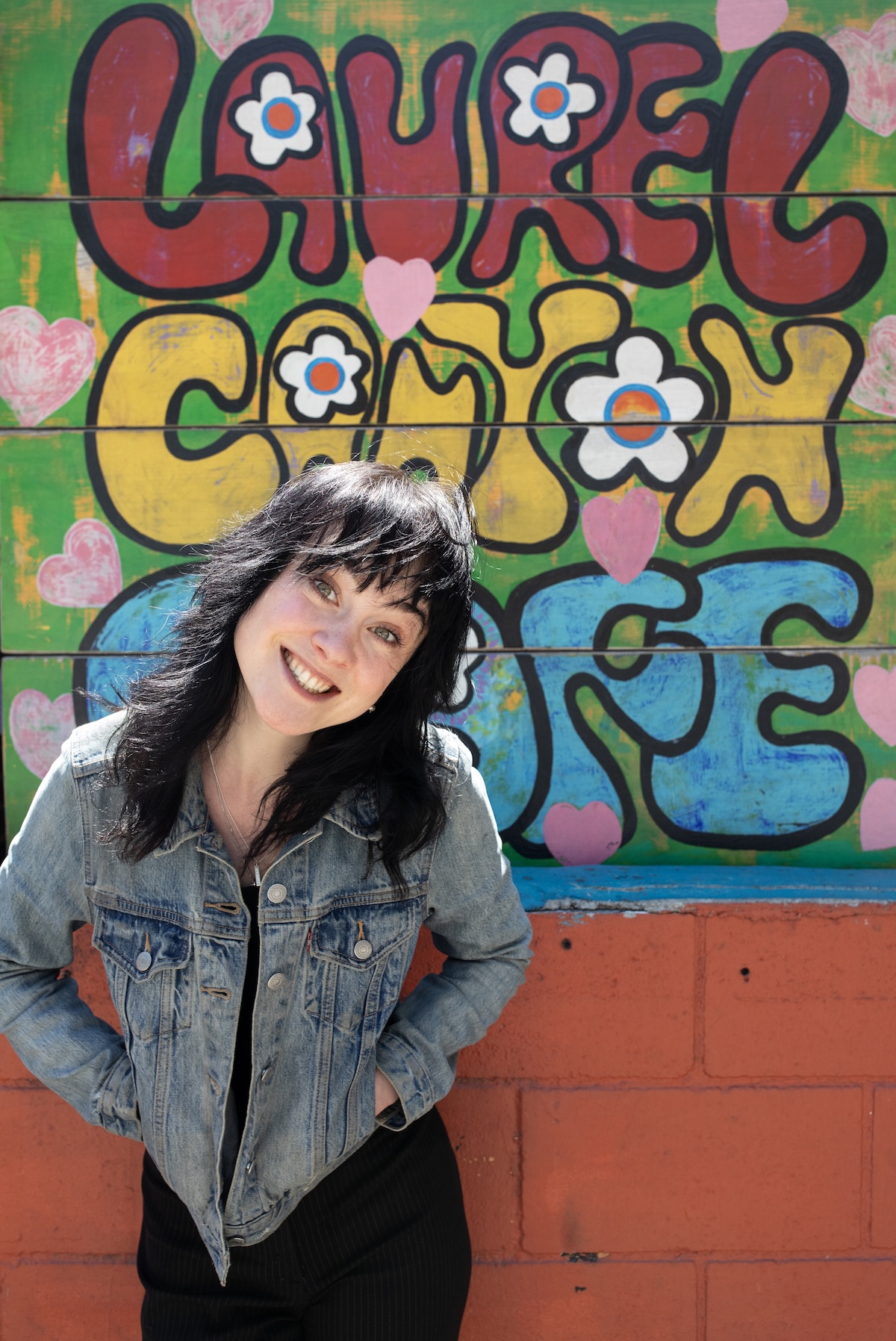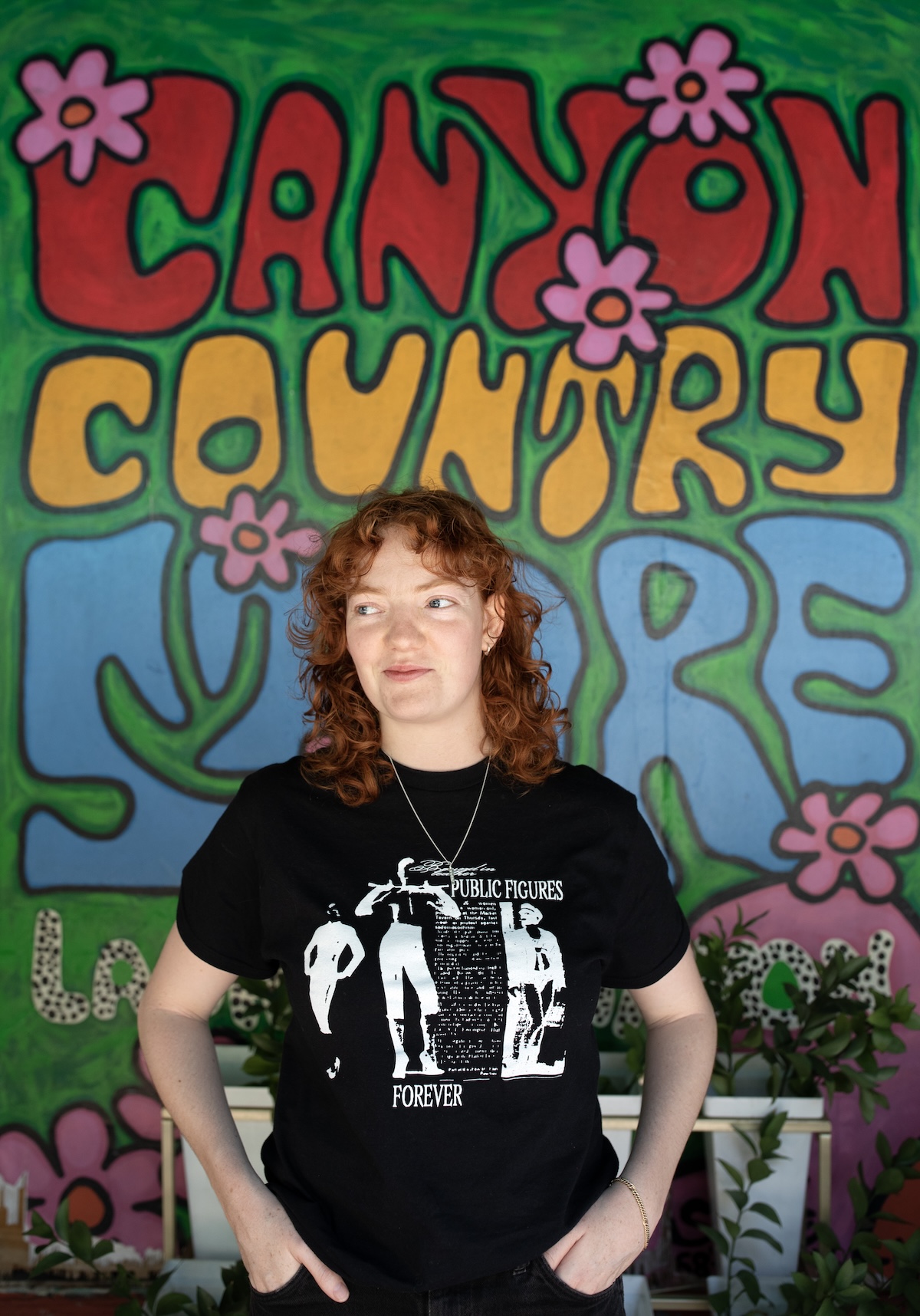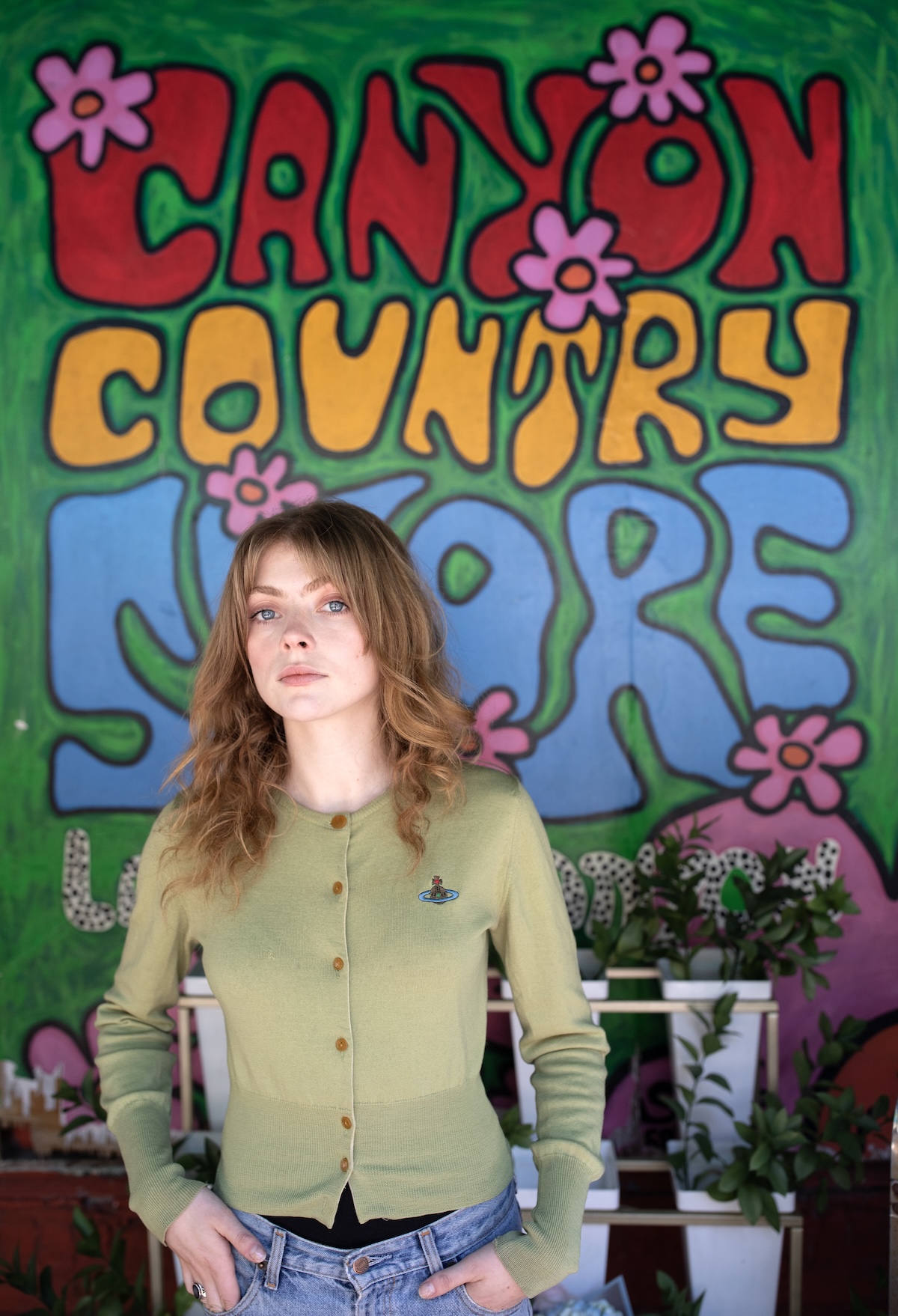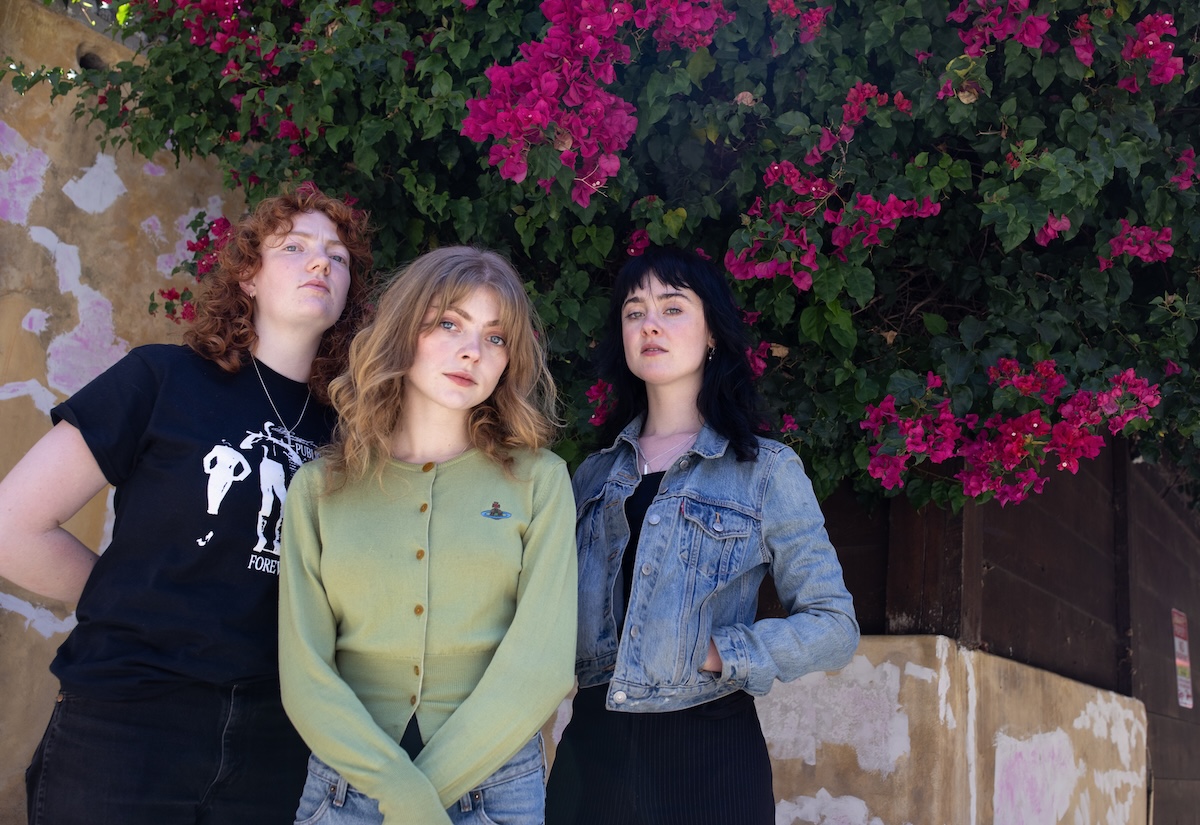It’s a bright weekday morning in Los Angeles as the singer-songwriters of Folk Bitch Trio roll up to the Laurel Canyon Country Store. This isn’t exactly a pilgrimage for them, but these young Australian folkies fully understand where they’re at, and have a sense of the profound musical history that has unfolded on these winding canyon streets over the decades.
As they settle onto an outdoor bench over coffee and matcha drinks, Gracie Sinclair, with dark hair and a denim jacket, happily summarizes that legacy this way: “It means ’60s paradise, rock ‘n roll, sex, drugs, freedom, intellectual stimulation, the Doors, Joni Mitchell, Joan Didion, Frank Zappa, Neil Young …”
Her partners in this singing trio—Heide Peverelle and Jeanie Pilkington—nod in agreement. On the surface, the singers of Folk Bitch Trio would seem like direct descendants of the folk-rock tradition and creative community that emerged from the canyon in the 1960s. It can be heard in the timeless harmonies and wistful acoustic guitar chords on their debut album, Now Would Be A Good Time, released this summer by Jagjaguwar, the label known for Sharon Van Etten and Bon Iver.
The lyrics, however, are strictly modern takes on life as experienced by these singer-songwriters from Melbourne, all of them 23 and born within a month of one another. “I think it feels right that we kind of tell our own story,” says Pilkington, who is the daughter of working musicians and recording studio owners. “We’re very autobiographical songwriters.”
This is their third-ever trip to America, and their third in just over a year. They will be back for a fourth visit during a two-week North American tour beginning November 7 in Washington, D.C.
At this little deli-bodega and outdoor coffee shop, a lasting landmark of the neighborhood for generations, the trio are just steps away from Jim Morrison’s former apartment. The Doors singer immortalized the neighborhood and little brick grocery in the song “Love Street,” singing: “I see you live on Love Street / There’s the store where the creatures meet.”
As usual, Laurel Canyon Boulevard is busy with commuter traffic. On the coffee patio, it’s a mix of young couples and aging hippies sipping their drinks and chatting in the sunshine. Across the road is a yellow multilevel home with signs advertising expert guidance to the transcendent and metaphysical: “Psychic of Los Angeles,” “Master Psychic & Medium,” and “60 Years Experience.”

“It’s great to be here in real life,” says Pilkington, blonde in a green sweater. “It’s very beautiful.”
The members of Folk Bitch Trio met at age 12 on the first day of school at Princes Hill Secondary, and became best friends. They shared a growing obsession with music, and were teens just graduated from high school when Pilkington turned to her friends and said: “Do you wanna start a folk bitch trio?”
That wasn’t an official band name until Pilkington’s mom, Barb, who booked their first gig as a band in a tiny Melbourne bar, championed what they loosely called themselves. “She was the only person in the beginning that was like, ‘Yeah, that rocks,’” Pilkington says of the name. “Everyone was pretty skeptical and said we’d probably regret it.”
They haven’t regretted the name yet. “It’s a descriptor of what we’re doing or who we are,” says Peverelle, red-haired in a crisp black T-shirt. “We were like, ‘Fuck it, let’s have a sing in the garage.’ We were hanging out every day and this was just a name for the hangout session.”
They were an utterly unknown group when Folk Bitch Trio made their first trip to the U.S., stopping first at the South By Southwest music festival in Austin, Texas, followed by Los Angeles, before returning home. It was an expensive and eye-opening journey.
“It was kind of a leap of faith at the beginning,” says Peverelle. “As Australians, you’re fed American media for your whole life. So it’s very familiar, but it’s also like a completely different atmosphere to where we’re from. It was a bit of culture shock for sure.”
Among the shocks was seeing the plight of some marginalized Americans, on display right on the street in ways unknown to them back in Australia. It was a dismaying revelation that stayed with them as the trio left Austin.
“We flew to L.A. and that flight is not very long, and I cried the whole time because I was so upset,” Sinclair says somberly. “I was so affronted by seeing people in wheelchairs with no legs rolling around on the street, like, being left to die. That doesn’t happen in Australia.
“It’s like America is crumbling and there’s so much wealth that people in positions of power are [able] to not look [at the poverty] … The first time we came, that’s what we were seeing on the street.”
Folk Bitch Trio is less surprised by what they see these days. And the 14-hour flight from Melbourne to Los Angeles is no problem.
“We’re always sitting together, so we just kind of snuggle up, watch some movies, and eat some snacks,” Peverelle explains with a smile. “That’s the vibe. It’s just like being on the couch, but on a really uncomfortable plane.”

It also happens to be the only time when Sinclair, who rarely watches movies or TV, dives into something onscreen. Pilkington turns to Sinclair and says, “It’s the one time I see you indulging. You’ll lock in and you’ll watch Eat Pray Love. You’ll watch that shit.”
Sinclair nods. “I watched Casablanca on the way home from Europe a couple of months ago, just sobbing and sobbing and sobbing and sobbing.”
On the album, Sinclair wrote a song about her impatience with television called “Cathode Ray,” a gently swirling song with purring harmonies singing, “No cathode ray / With a sweet release / I need a real view / From a real cheap seat / Better late than dead on.”
“I hate my time being wasted, and I feel that often when I’m watching TV or a bad movie,” she explains. The singer says she simply prefers listening to music.
Aside from heading to the U.S. on their own, Folk Bitch Trio’s early efforts included releasing a few indie singles. There are other recordings that were never released, but were essential in their growth as artists. The self-funded recordings and travel were early signs of a determined and self-sufficient band. Even before signing to Jagjaguwar on one of those visits to Los Angeles, Folk Bitch Trio recorded the album in New Zealand without any label support or input.
“It’s what we went into the studio to do. If we wanted to make a better record, then we should have,” Pilkington says with a laugh.
The first song written for the album was “God’s A Different Sword,” written mostly by Peverelle in the aftermath of a breakup. With lyrics written, as usual, somewhere between 10:00 p.m. and 2:00 a.m., the song begins with the strumming of dreamy acoustic guitars: “Am I lucky? Or am I just sane? / Have I been walking ’round in circles, always fumbling your name?”
“I came home after having a couple of glasses of wine and it just sort of fell out of me,” says Peverelle. “For me, I find that most of the time the songs just come out in one go. I write most of my songs at night.”

Once it was sketched out, Peverelle sent the new song to Pilkington and Sinclair. They approved, hearing something meaningful for the trio even beyond its personal story. “God’s A Different Sword” opens the album.
“It felt like the beginning of a new little chapter,” recalls Pilkington. “It was the song that turned the corner of us—thinking that maybe we should back ourselves and just make a full-length record. So opening the album makes a lot of sense.”
In the grainy, Super 8 music video for the song, Peverelle is seen playing a Flying V electric guitar, an instrument well-known to hard rock musicians. Its appearance with the Folk Bitch Trio indicated something much louder.
“I’m a poser,” admits Peverelle, who once worked in a guitar shop, as did Sinclair. “It was just a bit of a gag because our music is not Flying V vibes, but I think I could definitely make a Flying V work. Maybe that’s the next record.
“In late high school, I started jamming with a friend of ours and we were playing lo-fi jangle indie rock. And I thought, ‘Yeah, yeah, this is what I’ll do.’ We recorded four songs, and they sounded so shit. And then a few months later, Jeanie hit us up about starting the Folk Bitch Trio.”
On the song “That’s All She Wrote,” the group’s lush three-part harmonies are as warm and alluring as the folk sirens depicted in the 2000 Coen Brothers film O Brother, Where Art Thou?, a film steeped in American folk and bluegrass, and in one scene had enchanting female harmonies drawing in George Clooney and his fellow escaped convicts.

But the trio’s comparison to sirens has not been limited to that film, as some listeners reach for mystical explanations for their sound. “We’re not supernatural people,” Pilkington insists. “We don’t really resonate with the idea of the witchiness that some people seem to see in us. I respect anything that people see in this project—they’re allowed to take their own interpretation—but I don’t know if I get that one. But we do feel the magic for sure when we sing together and it’s good.”
More meaningful for Folk Bitch Trio is watching their following grow over time at different tour stops around the U.S. and Australia, and in seeing a new crop of excited folk bitches in the audience. “I’d say that those are my favorite audience members, like the divas who come up to us that are between 17 and 21, and they’re us,” says Pilkington. “They look like what we looked like when we started the band, and they tell us that we’re their favorite band. It just makes me so nostalgic for the women and fem-fronted projects that I looked up to when I was that age, and that formed the beginning idea of this. That’s a crazy full-circle moment.”

Leave a comment